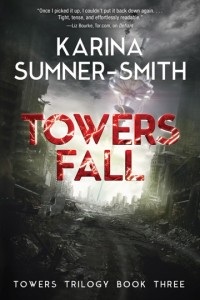Karina Sumner-Smith is the author of the Towers Trilogy from Talos Press: Radiant (Sept 2014), Defiant (May 2015), and Towers Fall (Nov 2015). She lives in rural Ontario by the shores of Lake Huron. Visit her online at karinasumnersmith.com.
Is there a literary heroine on whom you imprinted as a child? A first love, a person you wanted to become as an adult, a heroic girl or woman you pretended to be on the playground at recess? Who was she?
Back when I was making my first few forays into fantasy and science fiction written for adults, I borrowed a towering stack of Sword and Sorceress anthologies from an adult friend. I read through them at an alarming rate. Every one was filled with stories that I not only enjoyed (swords and magic and adventures!) but because they were about women. I’d keenly felt the lack of interesting, relevant women in many of the stories I’d been reading, and found myself nodding enthusiastically with all those characters who demanded to know why they should have to stay home working on their embroidery while their brothers went out adventuring.
After a dozen or so of the anthologies, I found myself wanting something more, something deeper—and yet I always looked forward to reading Mercedes Lackey’s Tarma and Kethry stories.
Can you remember what it was these characters did or what qualities they had that captured your affections and your imagination so strongly?
Well, at the time it was hard to go wrong with stories about warrior women and sorceresses—and with Tarma and Kethry I had one of each. They were friends and heart-sisters working together to right wrongs and make things better in the world around them, especially for other women.
They were competent, both of them; they were people who had adventures and took care of problems—and who had each other. But I think that it was the idea of a powerful, life-changing friendship and bond between these two women that really caught my attention and held it through so many stories.
How does she compare to the female characters in your work? Is she their literary ancestor? Do they rebel against all she stands for? What might your creations owe her?
I think that they’re my characters’ literary ancestor not so much in terms of personality, but in their relationship. I still love to find powerful relationships between women in the fiction that I read, and that kind of connection absolutely forms the emotional heart of my Towers Trilogy books.
My characters are, perhaps, far less noble than either Tarma or Kethry—homeless girl Xhea, especially, who starts the trilogy wanting little more than enough to eat, a safe place to sleep, and to be left alone already. The ghost girl, Shai, starts the books lost and uncertain, valued by others more for what she is than who she is, though her journey is one of coming into her own strength and confidence. Yet the critical part is how they relate, and how the world around them changes because they choose to protect and save each other.
How do you feel about the word heroine? When I started talking to people about writing these posts, I am specifically looking for female authors’ female influences, whether those women they looked up to were other writers or Anne of Green Gables. Does the word heroine have a purpose that isn’t served by equally well by hero?
As with so many words, I think it depends on context. I have seen “heroine” used to denigrate, to indicate that the woman to whom the word refers is somehow different than or less than the book’s male hero. Yet I’ve also seen “heroine” used to celebrate, as I feel it is here—and, given that I’m always searching for books with complex, interesting women as protagonists, it’s a word that I keep an eye out for on a book’s cover. It’s a useful word, that way.
About this post: The Heroine Question is my name for a series of short interviews with (mostly) female writers about their favorite characters and literary influences. Clicking the link will allow you to browse all the other interviews, with awesome people like J. Kathleen Cheney, Linda Nagata, and Kay Kenyon. If you prefer something more in the way of an actual index, it’s here.




